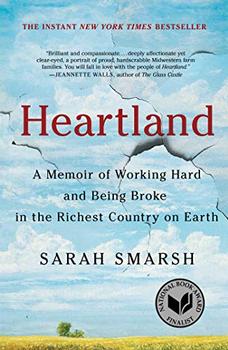Summary | Excerpt | Reading Guide | Reviews | Beyond the Book | Readalikes | Genres & Themes | Author Bio

A Memoir of Working Hard and Being Broke in the Richest Country on Earth
by Sarah Smarsh
"Too many of us now tend to worship self-indulgence and consumption," Carter said, his pale eyes full of worry. "... But we've discovered that owning things and consuming things does not satisfy our longing for meaning."
That's where he was wrong. The country had not discovered those truths, not in the slightest. In fact, on the eve of the garish 1980s, our lesson was just beginning.
That's not to say people couldn't see economic trouble brewing. Carter's speech cited a poll suggesting that, for the first time in the country's history, most people thought the next five years would be worse than the last. Ten years of inflation had shrunk the value of a dollar and, with it, people's hard-earned savings. Natural resources once presumed limitless were being recognized as precious and finite.
We were at a fork in the road, Carter told millions of people through their living room television sets, and had to choose a path: remain fearful and selfish, grasping for economic advantage over other countries and even our own neighbors, or embrace unity.
"This is not a message of happiness or reassurance," Carter said, "but it is the truth, and it is a warning."
It was a warning the country would not heed. Carter's poll numbers went up, but the country didn't change. That America couldn't hear his message about worshiping the false idol of wealth is a public fact that would be felt privately for decades to come. No one would feel it more than the poor
* * *
A few months after Carter's "crisis of confidence" speech, Jeannie and Nick got engaged. She had gotten her GED, and Nick had bought a spread of land near the lake for $350 an acre when it came up for auction. The wedding was set for January 1980.
But as the autumn leaves fell in 1979, Jeannie had second thoughts. She was seventeen, Nick twenty-four, but she often felt she was more mature than he was. She was thinking about calling off the wedding until, on Halloween night, they were messing around in Nick's parents' basement.
"Don't come in me," Jeannie told him.
Nick came in her anyway.
"I said 'don't come in me'!" she said.
"I thought you said, 'come in me,'?" he said.
As Jeannie went up the stairs from the basement, out the door and into the dark, to turn a cold car engine under the big sky of a flat landscape, she felt different.
"I knew I was pregnant," she told me. Unlike most of our family, she usually disliked vulgarity. I was embarrassed, when she told me the story after drinking a great deal of boxed wine, to hear her say "come." I wasn't at all surprised by the point of her story, though—that a poor teenage girl in rural Kansas might experience pregnancy as an inevitable life sentence. A family cycle so old and deep tends to go unexamined and unquestioned but is always felt.
Your presence in my life both helped and worried me. When I was in junior high, I already knew that the spirit I felt beside me would be either my downfall or my redemption—that you would be either an unwanted fate crying in my arms or a pattern that I had ended by my own will.
Jeannie never took that sort of mission for herself, I guess, and neither did Betty. It's lucky for me that they didn't. But two things can be true at the same time. I'm grateful for my early life, and I wouldn't wish it on any child.
On a windy, cold day at the outset of 1980, Jeannie and Nick married at St. Rose, a small, white clapboard church built at the turn of the century. Still in her first trimester, Jeannie looked slim in her white lace dress, and no one was the wiser. After the ceremony, their friends and family from surrounding farms and busted corners of Wichita gathered at a big dance hall called The Keg in the small town of Colwich. It was thirty miles away but had a stage and space for a proper Catholic wedding dance. They ate brisket, drank cans of Coors beer, and danced to a country band. Nick shaved off his beard for the occasion, and Jeannie looked even younger than she was.
Excerpted from Heartland by Sarah Smarsh. Copyright © 2018 by Sarah Smarsh. Excerpted by permission of Scribner. All rights reserved. No part of this excerpt may be reproduced or reprinted without permission in writing from the publisher.
Your guide toexceptional books
BookBrowse seeks out and recommends the best in contemporary fiction and nonfiction—books that not only engage and entertain but also deepen our understanding of ourselves and the world around us.